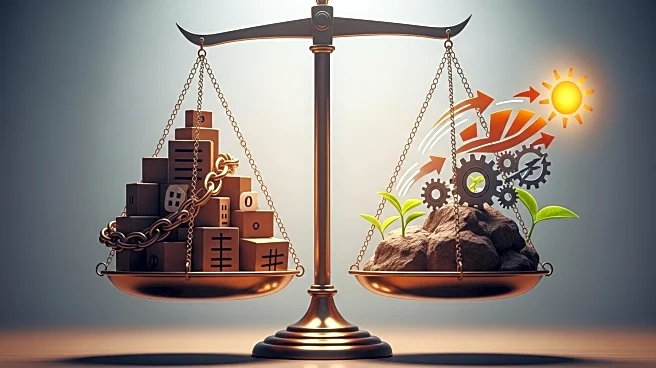What's Happening?
China has announced it will no longer seek the special treatment afforded to developing countries under World Trade Organization (WTO) agreements. This decision, revealed by Chinese Premier Li Qiang during a speech in New York, is seen as an effort to strengthen the global trading system amidst ongoing tariff wars and protectionist measures. The move comes in response to long-standing demands from the United States, which has criticized China's developing-country status given its position as the world's second-largest economy. The change will apply to ongoing and future negotiations, but not to existing agreements. WTO Director-General Ngozi Okonjo-Iweala welcomed the decision, noting it removes a significant point of contention and could pave the way for reform within the organization.
Why It's Important?
China's decision to relinquish its developing-country status in the WTO could have significant implications for global trade dynamics. By addressing one of the major criticisms from the U.S. and other developed nations, this move may ease tensions and foster a more cooperative environment for trade negotiations. It could also lead to increased access for foreign goods in China's market, benefiting exporters from the U.S. and Europe who have faced barriers. However, the decision underscores the complex nature of China's economic identity, as it continues to position itself as a developing nation while being a major global economic power. This development may influence other countries' approaches to trade negotiations and their own status within the WTO.
What's Next?
The impact of China's decision on future trade negotiations remains to be seen. The U.S. and other countries may respond positively, potentially leading to more favorable trade terms and reduced tariffs. However, the broader implications for the WTO's reform efforts and the global trading system will depend on how other developing countries react and whether they follow China's lead. The decision could also prompt discussions on redefining the criteria for developing-country status within the WTO, influencing future trade policies and agreements.
Beyond the Headlines
China's move to forgo its developing-country status highlights the evolving nature of global economic power structures. As China continues to provide loans and technical assistance to other nations, its role as both a developing country and a major economic player becomes increasingly complex. This dual identity may influence China's diplomatic and economic strategies, as well as its relationships with both developed and developing nations. The decision also raises questions about the future of the WTO and its ability to adapt to changing global economic realities.









